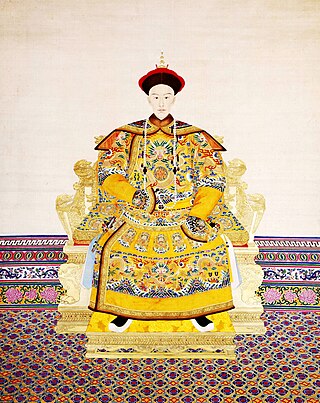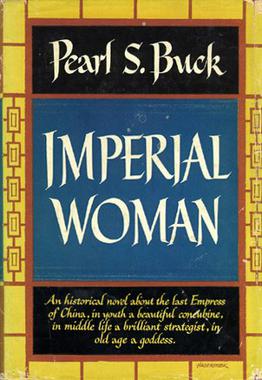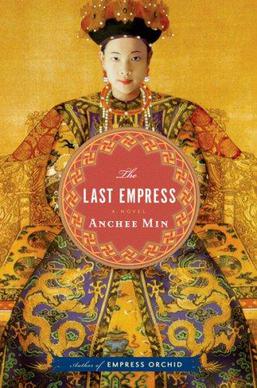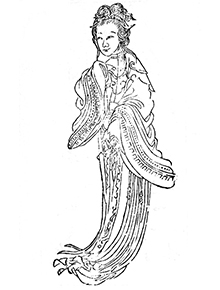
Empress Dowager Cixi, was a Manchu noblewoman of the Yehe Nara clan who effectively controlled the Chinese government in the late Qing dynasty as empress dowager and regent for almost 50 years, from 1861 until her death in 1908. Selected as a concubine of the Xianfeng Emperor in her adolescence, she gave birth to a son, Zaichun, in 1856. After the Xianfeng Emperor's death in 1861, his five-year-old son became the Tongzhi Emperor, and Cixi assumed the role of co-empress dowager alongside Xianfeng's widow, Empress Dowager Ci'an. Cixi ousted a group of regents appointed by the late emperor and assumed the regency along with Ci'an. Cixi then consolidated control over the dynasty when she installed her nephew as the Guangxu Emperor at the death of the Tongzhi Emperor in 1875. Ci'an continued as co-regent until her death in 1881.

The Guangxu Emperor, also known by his temple name Emperor Dezong of Qing, personal name Zaitian, was the tenth emperor of the Qing dynasty, and the ninth Qing emperor to rule over China proper. His reign was largely dominated by his maternal aunt Empress Dowager Cixi. He initiated the radical Hundred Days' Reform but was abruptly stopped when the Empress Dowager launched a coup in 1898, after which he was held under virtual house arrest until his death.

The Tongzhi Emperor, also known by his temple name Emperor Muzong of Qing, personal name Zaichun, was the ninth emperor of the Qing dynasty, and the eighth Qing emperor to rule over China proper. His reign, which effectively lasted through his adolescence, was largely overshadowed by the rule of Empress Dowager Cixi. Although he had little influence over state affairs, the events of his reign gave rise to what historians call the "Tongzhi Restoration", an unsuccessful modernization program.

The Xianfeng Emperor, also known by his temple name Emperor Wenzong of Qing, personal name Yizhu, was the eighth emperor of the Qing dynasty, and the seventh Qing emperor to rule over China proper. During his reign, the Qing dynasty experienced several wars and rebellions including the Taiping Rebellion, the Nian Rebellion, and the Second Opium War. He was the last Chinese emperor to exercise sole power.
Emperor Shun of Han was an emperor of the Chinese Han Dynasty and the eighth emperor of the Eastern Han. He reigned from December 125 to September 144.

Empress Xiaozhenxian, of the Manchu Bordered Yellow Banner Niohuru clan, was a posthumous name bestowed to the wife and empress consort of Yizhu, the Xianfeng Emperor. She was empress consort of Qing from 1852 until her husband's death in 1861, after which she was honoured as Empress Dowager Ci'an.

Yixuan, formally known as Prince Chun, was an imperial prince of the House of Aisin-Gioro and a statesman of the Manchu-led Qing dynasty in China. He was the father of the Guangxu Emperor, and the paternal grandfather of Puyi through his fifth son Zaifeng.

Zaifeng, also known as Tsai Feng, Prince of Ch'ün, formally known by his title Prince Chun, was a Manchu prince and regent of the late Qing dynasty. He was a son of Yixuan, the seventh son of the Daoguang Emperor, and the father of Puyi, the Last Emperor. He served as prince regent from 1908 to 1911 during the reign of his son until the Qing dynasty was overthrown by the Xinhai Revolution in 1911.

Yehe Nara Jingfen, of the Manchu Bordered Yellow Banner Yehe Nara clan, was the wife and empress consort of Zaitian, the Guangxu Emperor. She was empress consort of Qing from 1889 until her husband's death in 1908, after which she was honoured as Empress Dowager Longyu. She was posthumously honoured with the title Empress Xiaodingjing.
Imperial Noble Consort Keshun, of the Manchu Bordered Red Banner Tatara clan, was a consort of the Guangxu Emperor. She was five years his junior. She was known to foreigners as the Pearl Consort. Legend has it that she was drowned in a well on the orders of Empress Dowager Cixi.
The Empress Dowager is a 1975 Hong Kong historical film directed by Li Han-hsiang and produced by the Shaw Brothers Studio, starring Lisa Lu as Empress Dowager Cixi.

Imperial Noble Consort Wenjing, also known as Dowager Imperial Noble Consort Duankang, of the Manchu Bordered Red Banner Tatara clan, was a consort of the Guangxu Emperor.

Empress Xiaozheyi, of the Manchu Bordered Yellow Banner Arute clan, was a posthumous name bestowed to the wife and empress consort of Zaichun, the Tongzhi Emperor. She was empress consort of Qing from 1872 until her husband's death in 1875, after which she was honoured as Empress Jiashun.

Imperial Woman is a novel by Pearl S. Buck first published in 1956.

Empress Xiaojingcheng, of the Manchu Plain Yellow Banner Borjigit clan, was a posthumous name bestowed to a consort of Mianning, the Daoguang Emperor. She was honoured as Empress Dowager Kangci during the reign of her step-son, Yizhu, the Xianfeng Emperor. She was the only Qing empress dowager who was neither her husband's empress consort nor emperor's mother.

Empress Xiaokangzhang, of the Manchu Bordered Yellow Banner Tunggiya clan, was the concubine of the Shunzhi Emperor and mother of the Kangxi Emperor during the Qing dynasty. She was honoured as Empress Dowager Cihe during the reign of her son and was posthumously honoured as empress, although she never held the rank during her lifetime.

The Last Empress is a historical novel by Anchee Min that provides a sympathetic account of the life of Empress Dowager Cixi, from her rise to power as Empress Tzu-Hsi, until her death at 72 years of age. Akin to the bestselling and preceding novel in the series Empress Orchid, names within the story are different in spelling but retain the same pronunciation - allowing the reader to identify each relevant character to his or her real life counterpart.

Consort Li, imperial consort rank Chenfei, was an imperial consort of the Song dynasty of China. She was a concubine of Emperor Zhenzong and the mother of Emperor Renzong. She was posthumously honored as Empress Dowager Zhangyi (章懿皇太后), after Emperor Renzong discovered that she was his real mother.
Reign Behind a Curtain is a 1983 historical drama film directed by Li Han-hsiang. Sequel to The Burning of Imperial Palace, this film tells the story of Cixi's consolidation of power. It stars Liu Xiaoqing as Empress Dowager Cixi, Chan Wah as Empress Dowager Ci'an and Tony Leung Ka-fai as the Xianfeng Emperor. The film was nominated for eight awards at the 3rd Hong Kong Film Awards and won two. Tony Leung, who made his debut in the prequel to the film, won the Best Actor Award.














